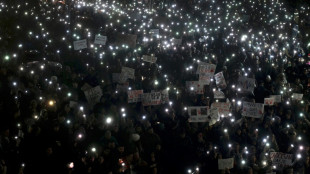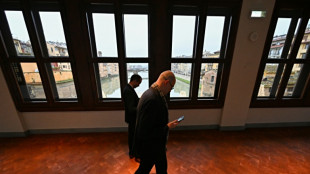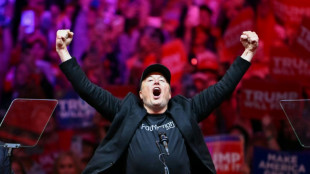
-
 Wall Street climbs as markets brace for possible govt shutdown
Wall Street climbs as markets brace for possible govt shutdown
-
Pogba wants to 'turn page' after brother sentenced in extortion case

-
 Court rules against El Salvador in controversial abortion case
Court rules against El Salvador in controversial abortion case
-
Reggaeton star Daddy Yankee, wife resolve business dispute

-
 French court hands down heavy sentences in teacher beheading trial
French court hands down heavy sentences in teacher beheading trial
-
Israel army says troops shot Syrian protester in leg

-
 Tien sets-up all-American NextGen semi-final duel
Tien sets-up all-American NextGen semi-final duel
-
Bulked-up Fury promises 'war' in Usyk rematch

-
 Major reshuffle as Trudeau faces party pressure, Trump taunts
Major reshuffle as Trudeau faces party pressure, Trump taunts
-
Reggaeton star Daddy Yankee in court, says wife embezzled $100 mn

-
 Injured Eze out of Palace's clash with Arsenal
Injured Eze out of Palace's clash with Arsenal
-
Norway's Deila named coach of MLS Atlanta United

-
 In Damascus meeting, US drops reward for arrest of Syria's new leader
In Damascus meeting, US drops reward for arrest of Syria's new leader
-
Inter-American Court rules Colombia drilling violated native rights

-
 Amazon expects no disruptions as US strike goes into 2nd day
Amazon expects no disruptions as US strike goes into 2nd day
-
Man Utd 'more in control' under Amorim says Iraola

-
 Emery insists Guardiola 'still the best' despite Man City slump
Emery insists Guardiola 'still the best' despite Man City slump
-
US confirms billions in chips funds to Samsung, Texas Instruments

-
 English Rugby Football Union chairman quits amid pay row
English Rugby Football Union chairman quits amid pay row
-
Wall Street rebounds despite US inflation ticking higher

-
 Major reshuffle as Trudeau faces party pressure, Trump attacks
Major reshuffle as Trudeau faces party pressure, Trump attacks
-
Serbia schools to shut amid new protests over station collapse

-
 Serbia schools shut amid new protests over station collapse
Serbia schools shut amid new protests over station collapse
-
Gatland remains as Wales boss but must 'change fortunes on the pitch'

-
 Argentina's dollar craze cools under greenback-loving Milei
Argentina's dollar craze cools under greenback-loving Milei
-
Medici secret passageway in Florence reopens after refit

-
 Anger after Musk backs German far right
Anger after Musk backs German far right
-
Arteta says 'best is yet to come' as he marks five years at Arsenal

-
 Pereira happy to achieve Premier League 'target' with Wolves
Pereira happy to achieve Premier League 'target' with Wolves
-
'Dark lull' in German energy transition sparks political debate

-
 Russian skaters allowed to compete as neutrals in 2026 Winter Olympics
Russian skaters allowed to compete as neutrals in 2026 Winter Olympics
-
Russian missile barrage on Kyiv kills one, damages embassies

-
 No longer Assad's mouthpiece, Syrian media face uncertainty
No longer Assad's mouthpiece, Syrian media face uncertainty
-
US diplomats meet with Syria's new ruler

-
 EU, Swiss hail 'historic' new deal resetting relations
EU, Swiss hail 'historic' new deal resetting relations
-
Stocks retreat as US inflation ticks higher

-
 Two dead after Lapland tourist bus crash in Finland
Two dead after Lapland tourist bus crash in Finland
-
Fed's favored inflation gauge edges higher in November

-
 Ex-IMF chief Rato gets four-year jail term in Spain for tax crimes
Ex-IMF chief Rato gets four-year jail term in Spain for tax crimes
-
Spain orders 25 more Eurofighter jets from Airbus

-
 Anti-whaling campaigner Paul Watson arrives in France
Anti-whaling campaigner Paul Watson arrives in France
-
Fed's favored inflation gauge rises again in November

-
 Spurs boss Postecoglou blasts 'offensive' personal criticism
Spurs boss Postecoglou blasts 'offensive' personal criticism
-
Seven-year-old dies in stabbing attack at Croatia school

-
 'Life is short': Vonn makes comeback in St Moritz
'Life is short': Vonn makes comeback in St Moritz
-
Man Utd's Mount out for 'several weeks' as injury woes return

-
 Chilwell likely to be first to ask to leave Chelsea, says Maresca
Chilwell likely to be first to ask to leave Chelsea, says Maresca
-
US hours from government shutdown over Christmas

-
 French PM rushes to name new government by Christmas
French PM rushes to name new government by Christmas
-
Russian missile barrage on Kyiv kills one, damages diplomatic missions


'Dark lull' in German energy transition sparks political debate
As Germany heads for February 23 elections the grey winter weather has become a hot campaign topic because of its impact on the country's shaky green energy transition.
Twice in recent months electricity prices temporarily spiked in Europe's top economy because of a lack of both sunlight and wind to power its solar panels and turbines.
The phenomenon -- dubbed a "dark lull" -- briefly sent the price soaring to 936 euros ($972) per megawatt hour on December 12, twelve times the average for the preceding weeks.
Conservative opposition leader Friedrich Merz, whose CSU/CDU is widely expected to win the elections, seized on the issue to attack centre-left Chancellor Olaf Scholz.
In Europe's interconnected energy market, Merz told Scholz that "your energy policies are setting teeth on edge across the European Union, which is very angry with Germany".
The comment was rejected by the Greens, who have long been the political driving force behind Germany's transition away from fossil fuel and nuclear power and toward clean renewables.
The Greens' Vice Chancellor and Economy Minister Robert Habeck hit back that previous CDU/CSU-led governments under Angela Merkel had been "blind" to Germany's energy challenges.
To help fight climate change, Germany has pledged to phase out fossil fuels and reduce greenhouse gas emissions by 55 percent by 2030 from 1990 levels, and become carbon-neutral by mid-century.
- 'At the limit' -
The recent price spikes prompted some of Germany's most energy-intensive firms to temporarily limit or even halt production.
In the December 12 incident, Germany bought electricity at the European Energy Exchange in Leipzig, causing a spike in prices in neighbouring countries.
Meanwhile the German energy sector is ringing alarm bells.
Markus Kreber, head of the biggest energy supplier RWE, said the recent dips in renewable supply "would not have been manageable on another day with a higher peak load, for example in January".
He warned that the system is currently operating "at its limits".
The situation after the most recent dip soon stabilised as renewables production picked up again, and households and most businesses remain shielded from day-to-day price fluctuations by fixed tariffs.
The Scholz government defended the green energy transition despite the occasional "temporary phenomenon" of a dark lull that can drive up prices on the spot market.
"There are phases in which the sun shines a lot, the wind blows a lot, and electricity is produced very cheaply in Germany, which is then gladly exported and supplies our neighbouring countries with electricity," said spokesman Steffen Hebestreit.
Renewables have become an ever more important part of Germany's energy mix, accounting for an average 60 percent of its electricity production so far this year.
Traditional sources of energy are being wound down, with coal power stations gradually shutting down after the last three nuclear power stations were taken off the grid last year.
- Political paralysis -
But many experts say the world's third biggest economy can ill afford such supply fluctuations when it's already struggling with a lack of competitiveness in other areas.
Analysts say Germany needs to scale up energy storage capacity and also develop other sources of production, such as gas and hydrogen, to pick up the slack when necessary.
"If the state establishes a good regulatory framework, then it should be possible to avoid shortages through investing in storage and having flexibility in supply," Georg Zachmann, energy and climate specialist at the Bruegel think tank, told AFP.
However, he said there was "a big concern that the framework will not be sufficient to quickly develop" the necessary infrastructure.
"It takes on average seven years to construct a wind power facility but just seven months to build a liquified natural gas terminal," said Claudia Kemfert, energy expert at the DIW institute. "It ought to be the other way around."
For now, Germany faces months of political paralysis after the collapse of Scholz's three-way coalition government.
The coalition's demise also means the scrapping of a key draft law for a project to build a network of gas and hydrogen power stations as part of the transition away from coal.
A new government will likely take several months to emerge after February's election and then set out its own energy policy.
The frontrunner Merz has already pledged to study a return to nuclear power.
A.Ruiz--AT
